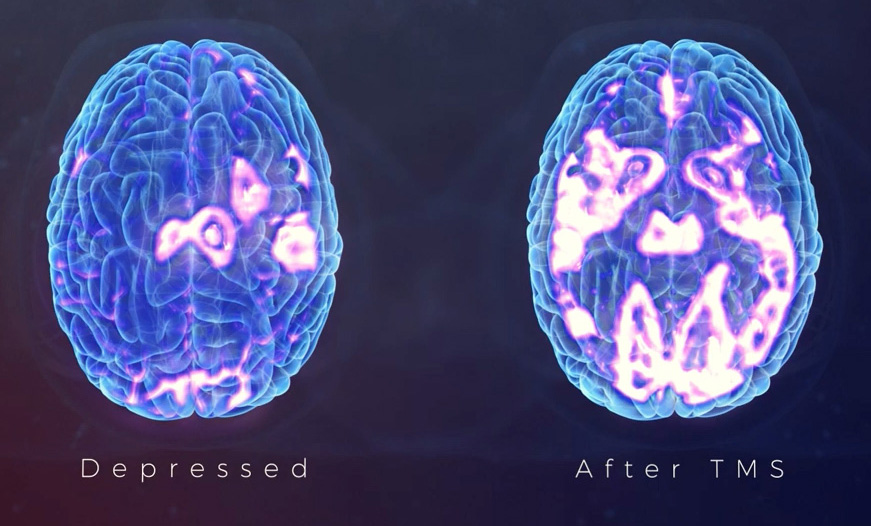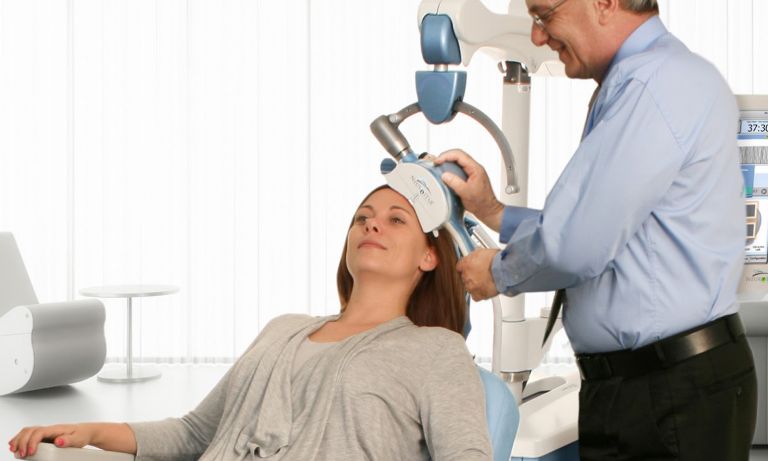How Does TMS Work
Transcranial Magnetic Stimulation (TMS) Therapy
A non-invasive treatment method that gives magnetic pulses directly into the brain, helping stimulate important nerve cells, which helps improve depressive symptoms. This particular treatment has gained impulse over the years because of its efficacy in treating even severe cases of depression. TMS may be as much as twice as effective as antidepressant medications. TMS delivers localized electromagnetic pulses to the area of the brain that regulates mood to stimulate cortical neurons and relieve symptoms of depression.
TMS is conducted in sessions lasting approximately 30-60 minutes, two to five times a week, for four to six weeks. No sedation nor anesthesia is required, and patients can resume their usual activities immediately after each session. Some people may notice temporary improvement as soon as the first or second week as existing neural circuits are stimulated. Repeating the treatment over many weeks gradually encourages new circuits to form, making depression relief self-sustaining for many patients.
TMS therapy is not linked with systemic side effects caused by the passing of medication through the bloodstream, unlike antidepressants. Some patients report mild-to-moderate discomfort from the electromagnetic pulses, although generally, they are well tolerated. Only 5% or less of patients discontinue treatment because of side effects.
Something essential to consider is that treatment may not eliminate the need to continue taking antidepressant medication; however, it can reduce the number of drugs needed by the patient and minimize the side effects associated with them. To maintain responsiveness, the patient may need to receive follow-up treatments.
TMS IN THE BRAIN.
When having a session of TMS, a small electromagnetic coil is placed against your skull, just above your forehead. When turned on, this coil delivers a small magnetic pulse into a specific part of the brain that controls mood. This pulse stimulates nerve cells in the brain’s regions that control your mood and emotions.
TMS TREATMENT FOR DEPRESSION.
To give you a small insight into how Transcranial Magnetic Stimulation Therapy treats depression, you should know that TMS activates specific regions of the brain that are underactive in people suffering from it. These regions are responsible for controlling both mood and emotional well-being. In this manner, TMS reduces stress and increases feelings of emotional well-being. Altogether, these changes elicit an emotional response that makes you feel happier. Simultaneously, it helps you discard any unwarranted depressive feelings in the process.


IS TMS FOR EVERYONE?
Although TMS sounds like the answer to everyone’s prayers or too good to be true, it will not work for everyone. First, it is imperative to acknowledge that every single depression treatment on the planet may not work for everyone; TMS positively affects up to 82% of the patients who try it, meaning that 18% approximately won’t respond well to it. There is an ample warning of being TMS almost exclusively reserved for what is known as Treatment-Resistant Depression, which essentially describes severe depression that has not responded to traditional treatment methodologies, including cognitive behavioral therapy and interpersonal and psychodynamic therapy.
In summary, TMS is ideal for those times when all else has failed. However, there may be considerations that could prevent you from receiving TMS Therapy that a doctor would need to determine.
TMS experience is simple and comfortable. You will relax in a comfortable reclining TMS chair, and we will ensure your comfort and answer all questions you may have about it. Our goal is to make you comfortable on your road to success. You will be fully awake during the treatment; you can read a book, watch TV or just chat, whatever you prefer. No post-treatment sluggishness, you can drive and resume your usual activities. You will repeat this process two to five times per week, for 4 to 6 weeks, based on how quickly your mood improves and remains stable. Patients begin to experience results within the first two weeks.
If you or a loved one has been diagnosed with depression and/or has not achieved satisfactory improvement from medications, then TMS Therapy may be able to help.
Whenever you are ready to live a depression-free life, contact us and get started on your experience.
